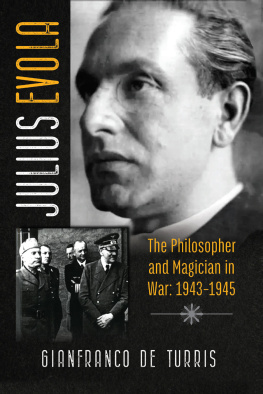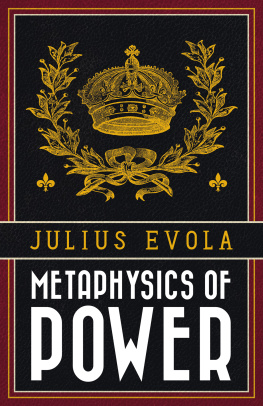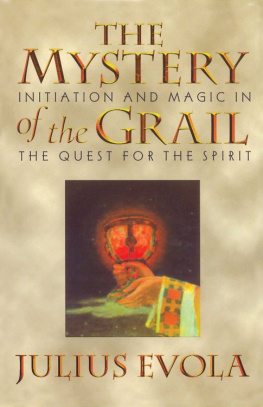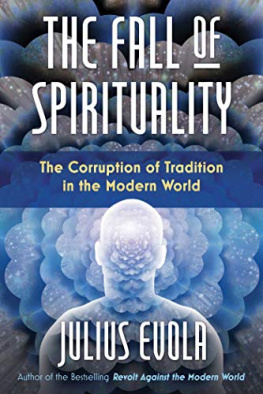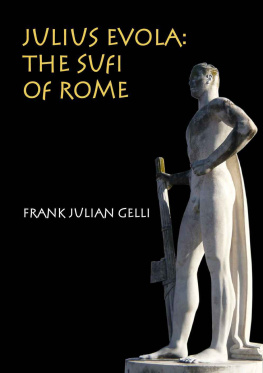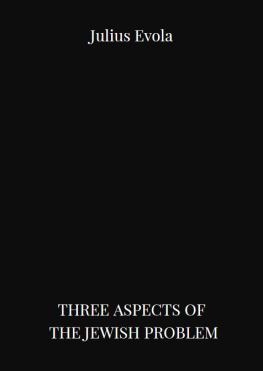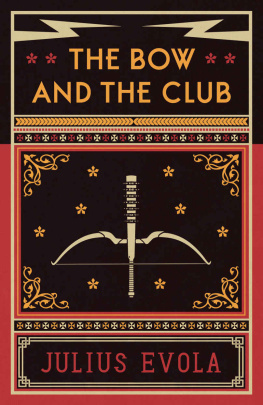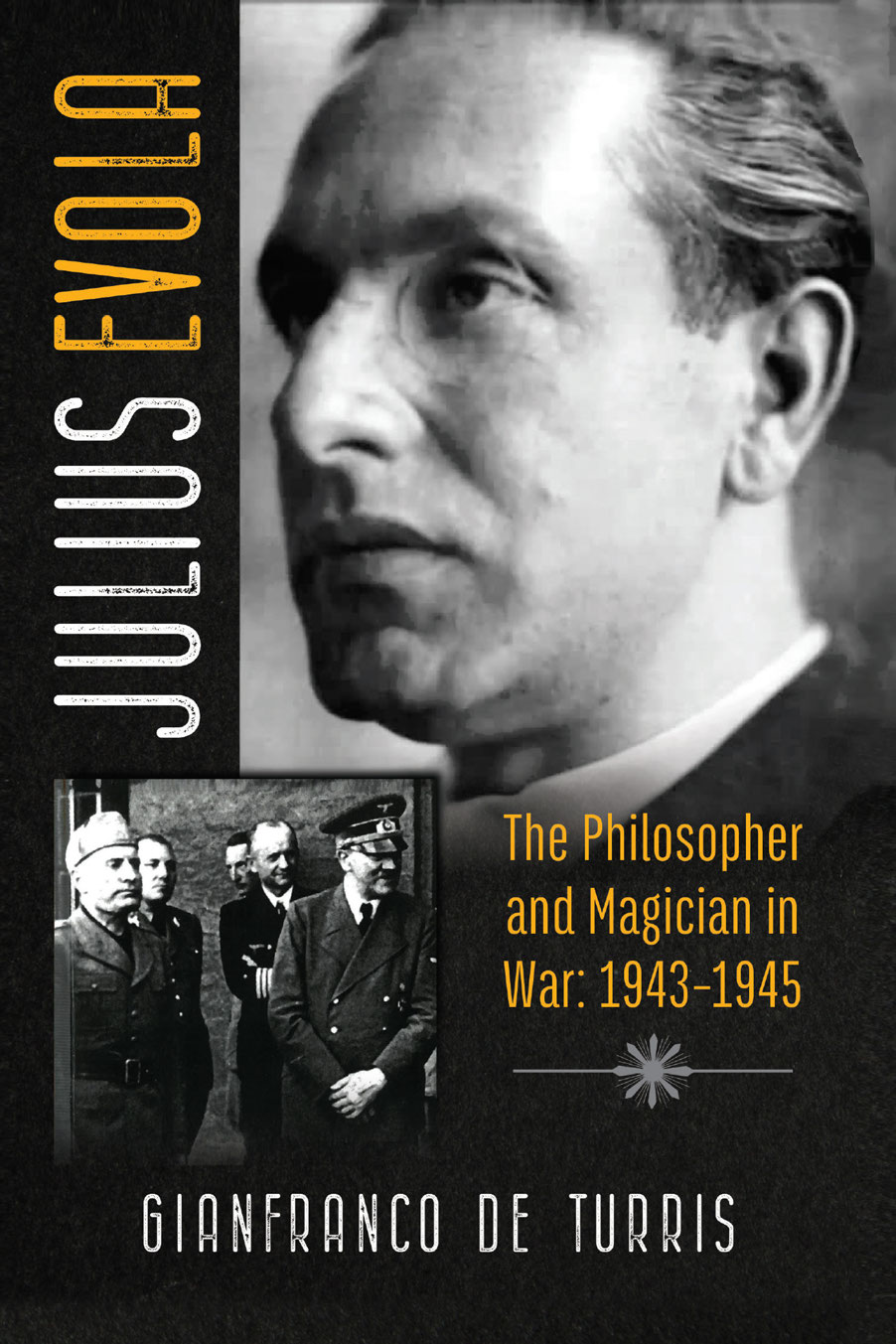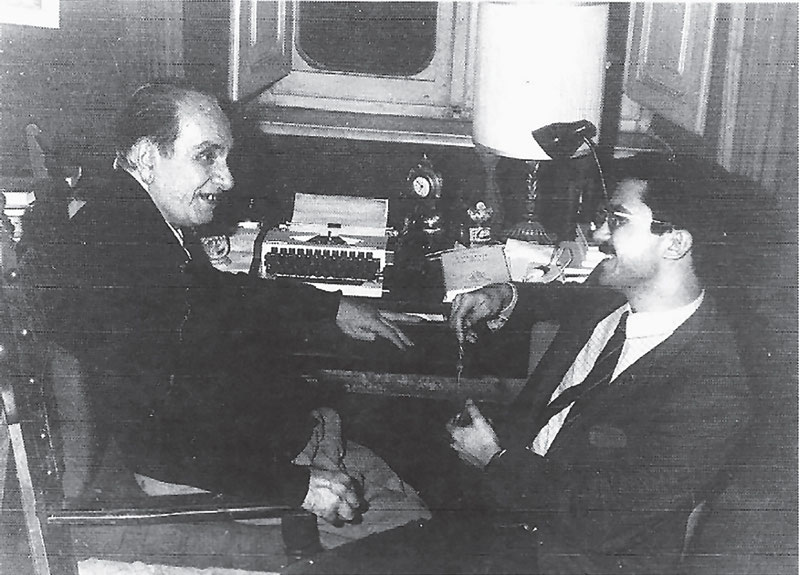Author Gianfranco De Turris interviewing Julius Evola at his residence, 1971.
Moreover, if you were still thinking of coming here, a meeting would be most appropriate, also concerning other matters of interest to us both, even though in this period of a danse macabre, plans can only be short-term and are always subject to a God willing.
LETTER FROM EVOLA TO THE PUBLISHER BOCCA
(AUGUST 16, 1943)
My point of view was that, from then onward, the war had to be continued until the end, and it would also mean fighting on lost positions, for there was no other alternative when faced with the unprecedented Allied demand for unconditional surrender, which had already been openly declared, but it was just as important to think of what would come afterward; that is, of what could be saved after the catastrophe, of what in Italy could still be created in a certain continuity with that anti-Communist and anti-Democratic idea.
EVOLA, WITH MUSSOLINI IN HITLERS HEADQUARTERS (1957)
Therefore, I felt no inclination to embrace the Fascism of Sal as an ideology. Nevertheless, I had to acknowledge the warrior and legionary value of the hundreds of thousands of Italians who had chosen to remain loyal to their allies and to continue the waras the king and Badoglio had falsely promised to do after the 25th of Julywith the awareness that they were fighting a losing battle, yet eager to defend the honor of the country. This remains an almost unheard of phenomenon in the history of Italy since the Roman Empire.
EVOLA, IL CAMMINO DEL CINABRO (THE CINNABAR PATH, 1963)

Acknowledgments
For this latest edition it is my duty and honor to thank Hans Thomas Hakl; Alberto Lombardo; and Professor Reinhard Mller for the discovery of the 1946 letter from Julius Evola; Adriano Scianca and Luca Valentini, who drew my attention to two texts of which I was unaware and which were useful in discussing some aspects of this book; Emanuele Mastrangelo and Andrea Scarabelli, whom I further refer for the readers interest to the footnotes; to both Prof. Gregory Alegi, the greatest Italian scholar on aeronautical history and Prof. Herv A. Cavallera, for the clarifications and bibliographical information requested by my mania to be ever more, and perhaps needlessly, precise. A special thanks goes to Professor Fabio De Felice for his willingness to remember the episodes from almost seventy years ago in Bologna of which he is one of the last living witnesses.
Last but not least, I would like to thank the French translator of the book, Philippe Baillet, and the publisher Jean Pantin, endowed with uncommon fastidiousness, who supplied me with some information and pointed out a good number of imperfections that not even Italian editorial inspection had identified. Not for nothing their publishing house is called Akribeia! Parallel to them has been the translator of the English language edition published by Inner Traditions of Rochester, Vermont, Eric Dennis Antonius Galati, whose exactness and precision informed me of further publication errors as well as being conscientious enough to do his own research to locate updated internet website addresses for those that were no longer in use or had been mistakenly reported as well as meticulous bibliographic details and supplying for the reader in English further footnotes concerning Italian history and its protagonists mentioned in the text.
For the second and third editions, I especially thank Luca Gallesi, Claudio Pirillo, Marco Rossi, and particularly Alberto Lombardo, who had suggested new profitable leads to follow.
I also thank all those who directly or indirectly have helped me with advice, both for the accepted and not accepted suggestions for added material and new paths to follow, the pointing out of errors and inaccuracies, the search for new material, especially Nunziante Albano and Mariano Bizzarri for the medical arguments and above all for Dr. Pets intuition; Giovanni Casadio and Giovanni Damiano for bibliographic research; Carlo De Risio for the military aspect; Sebastiano Fusco and Paolo Giachini for the American side of the story; Hans Thomas Hakl, especially for the unpublished letters of Walter Heinrich; Gennaro Malgieri for his unpublished testimony; Aldo A. Mola and Claudio Mutti for the Hungarian details; as well as Riccardo Rosati, Luca Valentini, Marco Zagni, and the Anonymous Sicilian.
A special thanks, however, goes to Alessio de Giglio for field research; Ines Doffini and Dalmazio Frau for the appendix of documents; Giovanni Sessa for the help in some indispensable practical aspects; Andrea Scarabelli for the index of names, andlast but not leastEmanuele Mastrangelo, cartographus maximus, for the graphic reconstruction that only he could achieve.
Without all these friends and their selfless help I could not have made the book any better than I have. At least I believe this to be the case.
FOREWORD
Following the Trail of History
Giuseppe Parlato
At the present point in time, the literature by and about the traditionalist philosopher Julius Evola is quite plentiful. There are studies that touch upon every aspect and phase of his life, from the period of his youth to the Second World War, and which deal with facets of his work ranging from the purely esoteric and philosophical to the essentially political. Despite this vast literary production, however, a biographical and historical study that specifically addresses one of the most delicate, difficult, and overlooked chapters in Evolas life has been absent. And this is what Gianfranco De Turris has finally achieved in the present work, which is based on previously undiscovered (or unconsidered) documents.
The time frame under consideration here stretches from July 25, 1943, until the mid-1950s, when the philosopher was faced with the absolute necessity of political action and when his first postwar works were published. This is a span of less than ten years, yet these were clearly not normal years in the leastneither from the perspective of what had taken place in Europe, and in Italy especially, nor with regard to the possibility of recovering archival material that could show in an irrefutable manner what the various geographical journeys and political events experienced by Evola were, as well as his thinking.
De Turriss great achievement has been to successfully documentwith scholarly precision and to the greatest possible extentall the obscure details, conflicting reports, and distortions that relate to Evolas complex itinerary of during and immediately following the Second World War.

